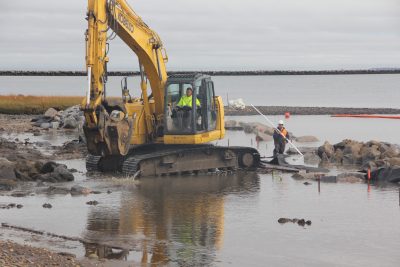
Connecticut Sea Grant has been awarded $125,000 in federal funds for ongoing initiatives that enhance community resilience to climate change impacts.
The funding will support the UConn Climate Corps program that advances locally based climate change adaptation activities and involves a service-learning component for Climate Corps students. It will also be used for projects that contribute to the restoration and management of Long Island Sound habitats that protect communities from flooding and storm damage.
“We are pleased to be able to continue supporting important extension work that both provides real-world learning opportunities for students and promotes habitat resilience in the face of a changing climate,” said Nancy Balcom, associate director for Connecticut Sea Grant.
Announced Thursday by the National Sea Grant College Program, the award was part of a $4.2 million allocation of funding from the National Oceanic and Atmospheric Administration to Sea Grant programs across the country to increase local capacity, engagement and implementation to address resilience challenges.
In addition, a complementary initiative with the U.S. Coastal Research Program was announced that is providing $3.9 million for resilience projects that apply coastal research findings in 10 states.
The funding for Connecticut Sea Grant will be used to enhance the Climate Corps program, a course offered at the UConn Storrs campus since 2017 that gives students an academic foundation in how climate change is impacting local communities, followed up with relevant service learning opportunities working with cities and towns. It is taught by Juliana Barrett, CT Sea Grant’s coastal habitat specialist, and staff at UConn Center for Land Use Education and Research (CLEAR).
“The Climate Corps is a win-win for students and our communities,” Barrett said. “Students gain valuable experience in applying knowledge to local issues and communities advance climate adaptation solutions and education efforts.”
The funding will also be used for projects by CT Sea Grant and UConn extension staff focusing on outreach and conservation of habitats such as salt marshes and species such as oysters that can buffer the effects of rising sea levels and intensifying storms.